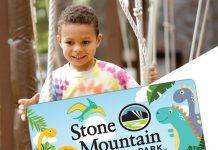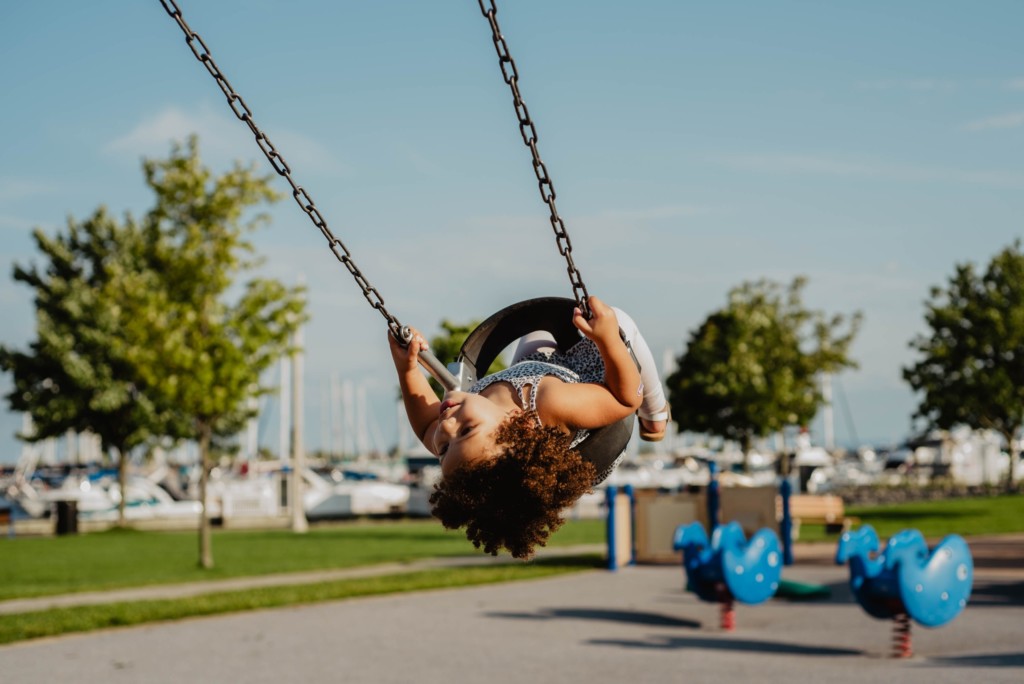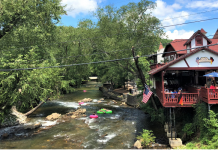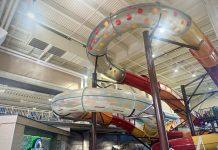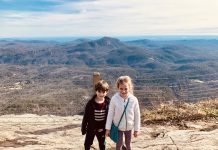Traveling with toddlers can be intimidating. The mere thought of disrupting a toddler’s normal daily routine, while spending money to contain them in a different location, plus the fact that your toddler won’t remember this holiday, causes some parents enough stress to put off family vacations for a few years.
But we all need a break from daily life, and having a toddler or preschooler shouldn’t be a deterrent to taking a vacation now. Traveling with young children does require more patience: I spent 30 minutes riding the moving walkways next to our gate while waiting for a flight out of BWI because my daughter found them fascinatingly fun. However, seeing the world anew through your young kids’ eyes – relishing the colors of a public garden, craning your neck upward at skyscrapers, taking in the sounds of a baseball game – is part of the reason we signed up for parenthood in the first place, right?
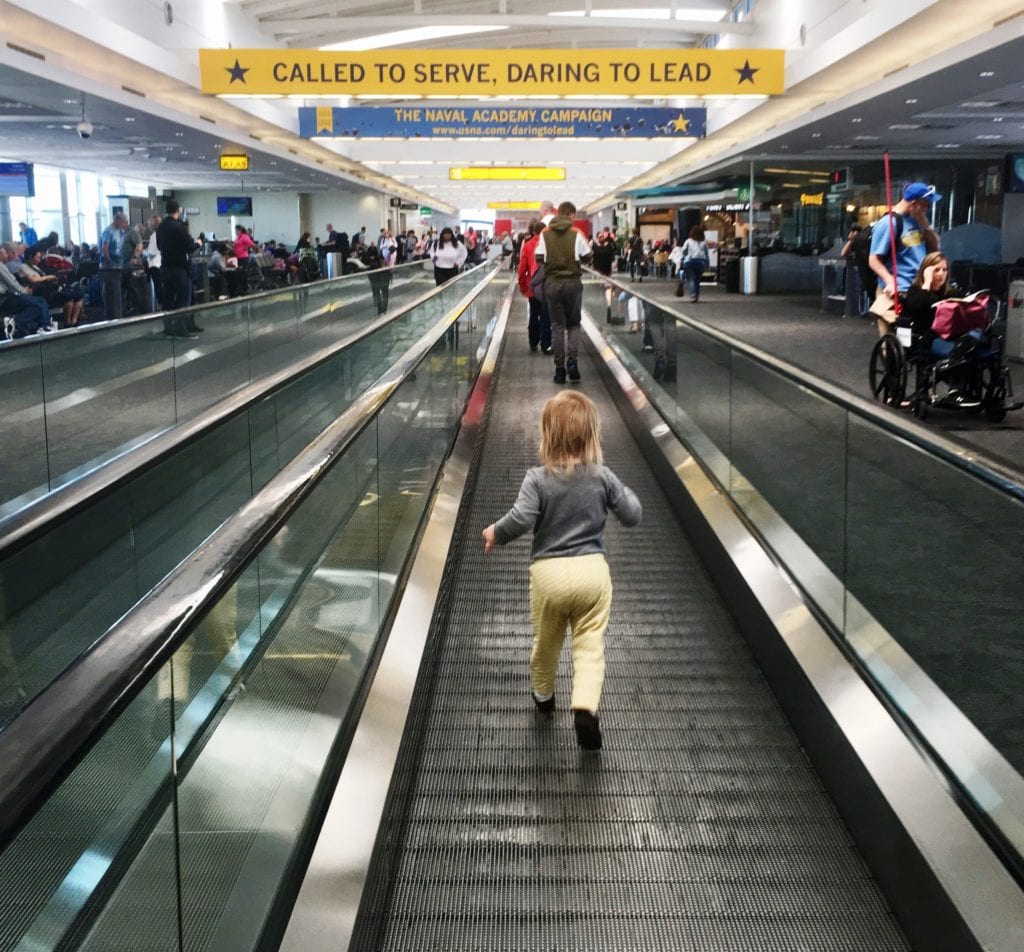
After traveling with our toddler a few times and living to tell about it, my husband and I are convinced that it’s not only possible but a good idea. Here’s why:
Traveling Exposes Your Child to New Things
My family traveled a lot when I was growing up, and I’m grateful for all I was able to see, hear, experience, and learn through travel. When I was in first grade, my parents asked my teacher if I would fall behind too far in class if they pulled me out of school for a week-long ski trip to Colorado. Go, she said, “Your Florida-grown child will learn way more from spending a week in mountains and snow than she will learn sitting in this classroom.”
Of course, she was right. I learned how to ski, ice skate, and make snow angels. I marveled at how chairlifts and snowplows work, and I learned how to wear all types of winter clothing that never sees daylight in Florida.
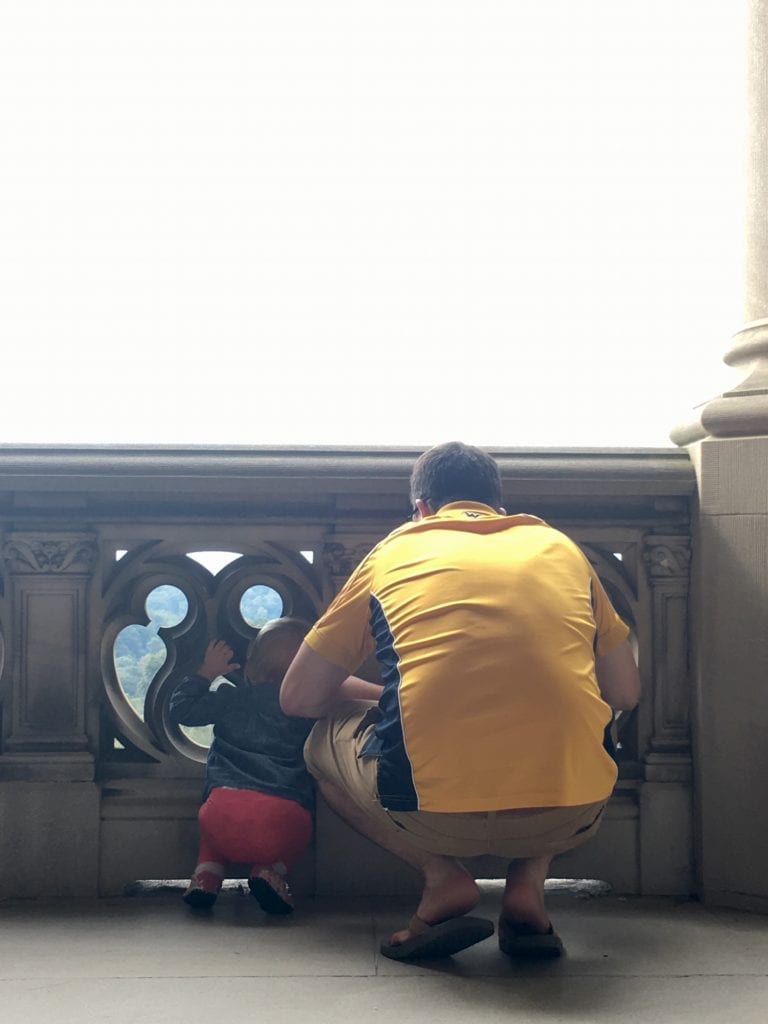
Taking your toddler or preschooler on vacation might not mean pure relaxation for you, but showing your child a world that’s totally different from your home will teach them things they might not otherwise understand. How do you adequately explain the enormity of the ocean without taking your child to a beach? How do you fully illustrate the height of mountains without driving, hiking, or riding up one? Even the process of traveling is educational. Learning about airplanes by flying on an airplane, or learning how to enjoy long car rides by going on a road trip is more instructive than reading or talking about planes and cars.
Learning through travel doesn’t mean a heavy lift for parents, either. Dr. Kyle Pruett writes that when you travel with young children, you’re instilling an appreciation for novelty, exploration, and problem-solving just by switching up your normal life routines. My 2-year-old doesn’t understand the physics of flight or all the nuances of airplane etiquette, but we’ve shown her and talked with her about the airplanes at Hartsfield-Jackson enough times that she now loves planespotting from our front yard. She doesn’t know much about the ocean, but we’ve taken her to the beach a few times and showed her what sand is, how waves crash on the shore, and what seagulls look like. Both explorations of the world are a good start to her education! Lessons about sea creatures and tides can come later; for now, we’re satisfied with setting the scene.
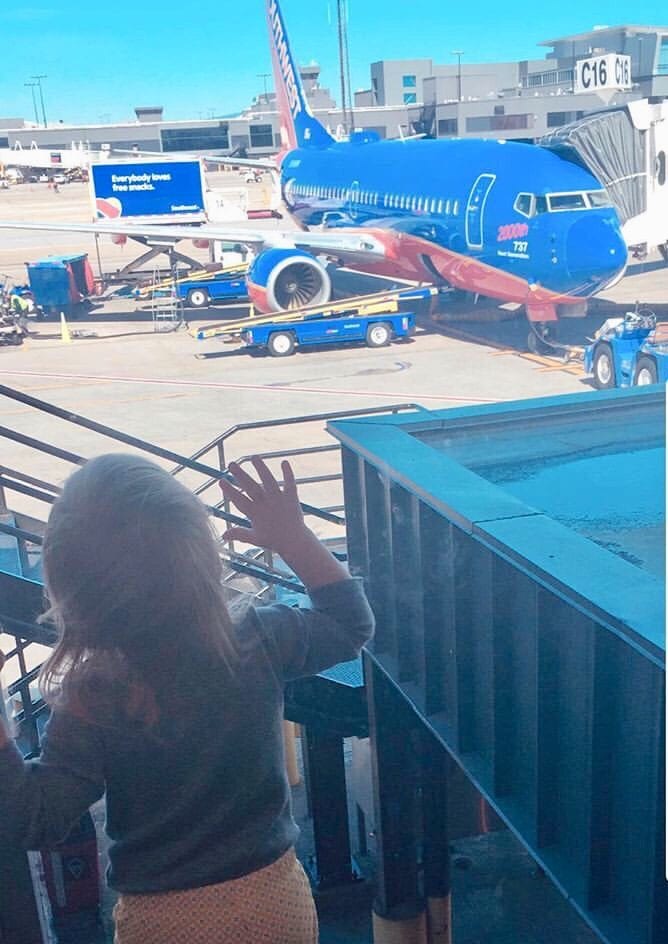
Make Early Positive Memories
Thanks to early childhood amnesia, children typically don’t remember life events from before age 3 or 4, and they don’t start forming long-term memories until after age 6 or 7. So a preschool vacation is likely to be buried deep in the brain shortly after you take it. However, because all of our experiences shape who we are, memories made before age 7 are still there, and still important.
If the experience is highly emotional, young children can remember what happened before age 4. According to researcher Carole Peterson, “very emotional, very significant” events can survive childhood amnesia because of their emotive weight. Significant events could be traumatic, such as breaking a bone and going to the hospital. But they could also be uplifting: A big vacation to an unusual place (at least, unusual to your toddler) or a series of getaways to a favorite family spot could form a lasting positive memory.
Case in point: My family toured the U.S. and Canada in an RV for 10 weeks when I was 4-years-old. According to my parents and numerous photo albums, we visited 37 states and 4 provinces, took in significant landmarks like Mt. Rushmore, the Grand Canyon, and the California redwoods, and basically lived our best American life for a summer. What are the only two things I remember from that trip of a lifetime? The Four Corners and VEGAS, BABY! I remember running and skipping around the platform that marked the juncture of Colorado, New Mexico, Arizona, and Utah because I had recently learned how to skip, and that was extremely fun. I also remember visiting Las Vegas because of all the lights, outrageous costumes, and carnival sounds. I can’t tell you which casinos we visited, if we saw a show, or where we ate, but, DANCING LIGHTS! LOUD MUSIC! PEOPLE DRESSED IN FEATHERS! Of course, I remember Vegas!
We haven’t taken our toddler to Las Vegas (yet), but we’re taking her on trips as often as we can so she can tuck the thrill of experiencing new things into her memories. With any luck, and with help from photos and the stories we’ll retell about these vacations as she grows, she’ll grow up with a healthy appreciation for other cultures and places.
Build Future Family Nostalgia
Retelling stories about early family vacations could help your child establish a sense of place, too. I like hearing stories about our RV trip because I’ve re-visited several of our stops as an adult, and it has been interesting to see how a location has changed (or not). It has also been fun to re-visit specific pinpoints. A warm nostalgia flows over me when I eat in a restaurant knowing I ate there as a child, and my parents entertained me by pointing to the pictures on the walls. Or when I stand at an overlook and remember a picture of the four of us standing at that same spot hung in the family den for several years. Even though I don’t directly remember that first vacation, I feel like I’m greeting an old friend or brushing up on a chapter of my family’s story when I visit again.
Maybe your family visits the same beach every year. Telling your kids that they’ve been part of this tradition since they were a baby will help them appreciate its significance even more. If you visit family in another state for certain holidays, tell your children as they grow about the wonderful holidays your family has enjoyed together when they were very young, and impress upon them that being together really is worth the effort.
Hopefully, my daughter listens when we retell stories about our early family vacations because it’s likely we’ll revisit some of those places when she’s older. I want her to laugh about the fact that she was scared of the sand and waves during her first beach trip. I want her to know that we rode the T all over Boston with her in her stroller, that we took her to a crowded Red Sox game, and that we rode the swan boats just for her because even at almost two years old, she was important enough to plan a vacation around.
Furthermore, I want her to know Mom and Dad enjoyed beers at Sam Adams Brewery while she napped so that if she becomes a parent, she’ll know that vacations with littles still mean a break for parents.
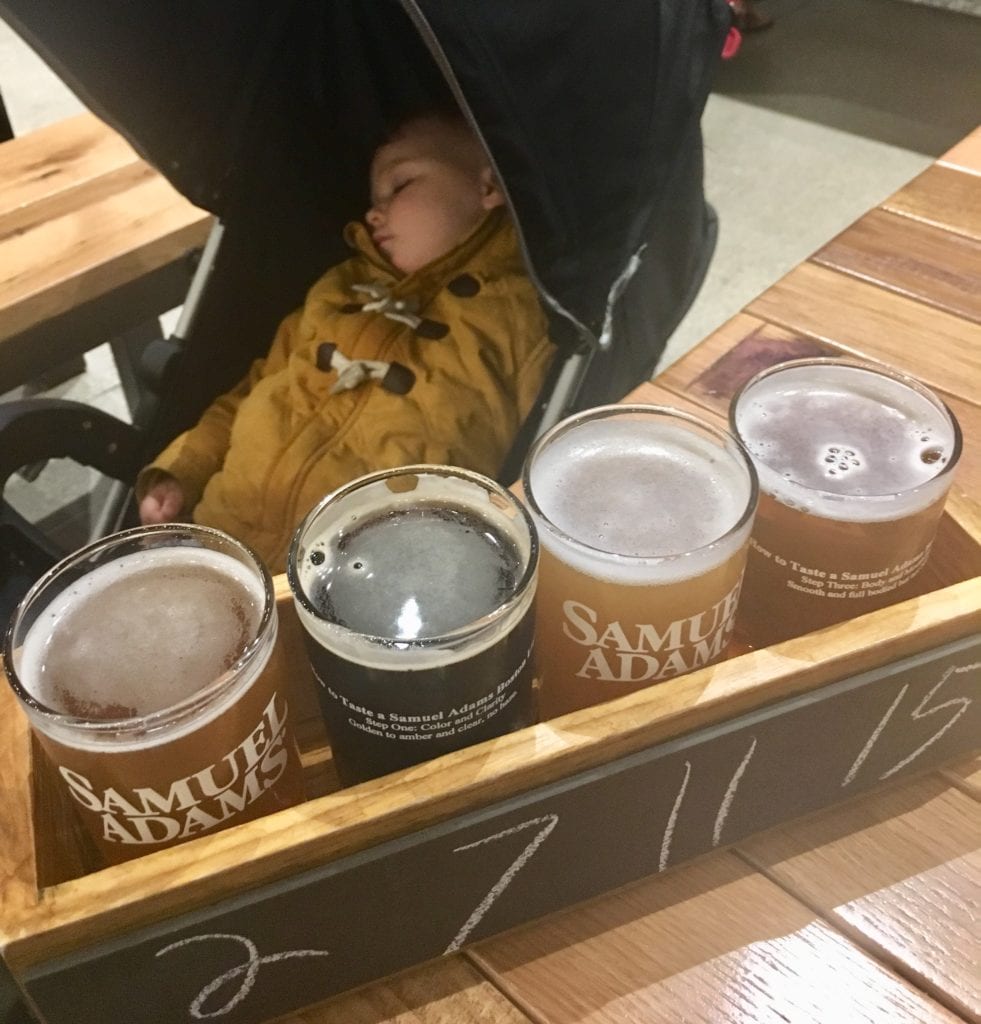
It’s Relatively Inexpensive to Travel with a Toddler
We took a vacation just before our daughter’s second birthday for a reason: Children under age 2 fly for free! Traveling with a toddler is relatively affordable. They don’t require an extra hotel room. (That is, in fact, frowned upon.) They can use public transportation gratis. They often eat and sight-see for free. Most attractions charge a reduced rate or nothing at all for preschoolers. Just bring some extra snacks, a few toys, and a stroller and you’re ready to go!
Traveling with toddlers isn’t as carefree as adults-only travel, but it’s worth it. Plan that dream vacation now. Don’t put it off until the kids are old enough to remember. Gift yourself, your partner, and your kids those happy memories now. Teach your kids how to explore, how to discover, and how to travel, now. Pack your bags, mama, and go!


